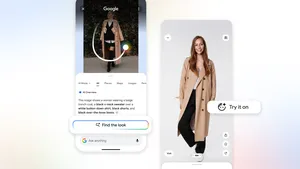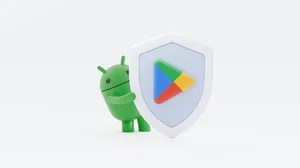Improvements to using Spanish in Search and Gboard

We’re continuing to work towards making AI useful for everyone, including by collaborating with others— and approaching it in a bold and responsible way.
A great example of this is Lengua Española e Inteligencia Artificial — Spanish Language and Artificial Intelligence (LEIA), a project the Real Academia Española (RAE) set up four years ago to improve the use of the Spanish language in technological environments. The Academia invited tech companies to join, committing to improving the use of the Spanish language in technological environments, helping the 590 million Spanish speakers worldwide and increasing the presence of the Spanish language.
Today, we’re announcing two major advances we’ve made as part of this project: First off, we’ve incorporated the lexical repertoire of the RAE’s Dictionary of the Spanish Language into Gboard, the keyboard app from Google. Second, we’ve integrated the Spanish Language Dictionary of the Royal Academy into Search.
Improved Spanish in Gboard
Thanks to the integration of the RAE lexicon as a source for Gboard's AI language models, we’ve seen key improvements in Gboard, such as faster autocorrections, in words such as García, Rodríguez, Coruña, Nicaragua or Jaén, and those with an accent — like música, río, frío o vehículo. It has also allowed for better word recommendations, smoother changes between English and Spanish when typing, and reduced biases.
Moreover, hundreds of thousands of new words ("ibuprofeno", "criptomonedas", "SMS", "tempura") have been integrated into the Gboard dictionary for Android.

Integration of RAE’s Diccionario de la Lengua Española into Search
As of this week, we’re also integrating the Spanish Language Dictionary of the Royal Academy into Search. This means when Google Search users from all over the world search for meanings of Spanish words, synonyms or examples of how to use Spanish words in sentences, the “Diccionario de la Lengua Española” will be the source powering such queries. The 23 Spanish language academies around the world participate in the Dictionary,making sure it reaches every Spanish speaker, regardless of the dialect varieties.

In addition to LEIA, in recent years we’ve made other advances to improve or increase the presence of the Spanish language in our tools. That includes incorporating Spanish grammar suggestions into Smart Compose and Google Docs, where punctuation marks have been added to the autocorrect, and corrections are suggested for sentences with grammatically incorrect pronouns. Machine learning has also enabled us to implement improvements in the automatic translation provided by Translate, generating improvements in Spanish, among other languages.
Our commitment to help increase the usage of the Spanish language in the world and a better use of the Spanish language in technological environments is the driving force behind our participation in LEIA. It’s our hope that AI will continue to benefit all Spanish speakers worldwide.






